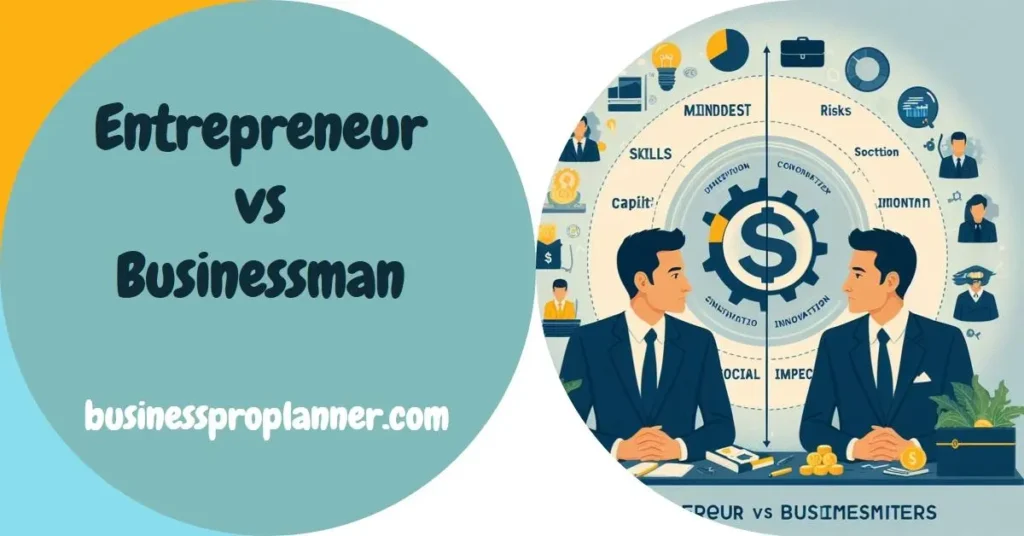An entrepreneur and a businessman are often used interchangeably, but there are some key differences between the two. Understanding the distinctions can help aspiring professionals define their paths in the business world based on their unique strengths and visions.
Key Takeaways
- An entrepreneur is an innovator who starts a new business to bring a new product or service to market. A businessman manages, operates, and assumes the risk of an existing business.
- Entrepreneurs are visionaries focused on innovation and changing the world. Businessmen are focused on generating profits by growing an existing business.
- Entrepreneurs take on more risk with new unproven ideas. Businessmen take less risk by expanding on proven business models.
- Famous entrepreneurs include Steve Jobs, Jeff Bezos, and Elon Musk. Well-known businessmen include Warren Buffet, Bill Gates, and Michael Bloomberg.
- Both entrepreneurs and businessmen are critical drivers of economic growth and innovation in the business ecosystem. Understanding their approaches helps aspiring professionals succeed.
Historical Context and Evolution
Entrepreneurship has existed as long as people have sought to produce and market innovations. In the pre-digital age, most businesses followed traditional models focused on incremental growth. The rise of technology startups and digital disruption has blurred some of the historical lines between entrepreneurs and businessmen.
Some key trends that have shaped the evolution include:
- The lower barriers to launching new tech ventures have unleashed waves of digital entrepreneurship.
- Business model innovation has become as important as product innovation for success.
- The iterative nature of software has enabled faster experimentation cycles for entrepreneurs.
- Digital tools allow entrepreneurs to reach global markets with lower capital requirements.
While these technology shifts have created more opportunities for entrepreneurship, traditional business fundamentals also remain vital. Understanding these historical influences provides context for the entrepreneur versus businessman debate.
Explain Who Are Entrepreneurs and Who Are Businessmen
Definition of an Entrepreneur
An entrepreneur is an individual who creates an innovative business intending to disrupt existing markets or create new product categories. Key elements of being an entrepreneur include:
- Developing and launching an innovative new product or service
- Taking on greater risk and uncertainty than traditional businesses
- Focusing on scaling quickly to achieve massive growth
- Changing consumer behavior and impacting society
- Willingness to fail fast and iterate based on market feedback
Entrepreneurs are pioneering visionaries who leverage new ideas to transform how business is done and change the world.
Characteristics and Approach of an Entrepreneur
- Passionate about new ideas and inventions
- Desire to change the status quo
- Comfortable with uncertainty and risk
- Persistent through setbacks and challenges
- Obsessed with finding solutions to problems
- Thrives on innovating and disrupting
- Moves fast and iterates products based on feedback
Definition of a Businessman
A businessman is an individual who assumes the risk and operational responsibilities of managing an existing business to maximize profits over time. Key elements include:
- Taking ownership of and running an already-established business
- Focusing on incremental improvement vs radical change
- Leveraging existing assets, processes, and models
- Aiming to expand market share within proven industries
- Minimizing risk and uncertainty around business operations
Rather than reinventing the wheel, businessmen seek to run highly optimized operations in established markets.
Characteristics and Approach of a Businessman
- Savvy at managing operations and finance
- Skilled at analyzing markets and competition
- Focused on consistency and efficiency
- Risk-averse and preference for predictable outcomes
- Pragmatic approach to increasing sales and profits
- Drive to expand existing products vs create new ones
- Mastery of details and numbers
Key Differences Between Entrepreneurs and Businessmen
Entrepreneurship and business management are two sides of the same coin, yet they stand apart in their essence and approach. To better understand the distinctions, let’s summarize the major points of comparison:

Entrepreneur vs Businessman – Here’s a detailed comparison:
| Aspect | Entrepreneur | Businessman |
|---|---|---|
| Vision | Seeks to change the world with new ideas. | Focuses on maximizing profits within an existing market. |
| Risk Factor | High, due to new ventures and untested markets. | Comparatively lower, as they operate within tried and tested frameworks. |
| Innovation | Drives innovation with new products and services. | Expands and improves on existing products. |
| Market Approach | Creates new markets or redefines existing ones. | Enters already existing markets to compete. |
| Objective | To initiate and establish a new concept or solution. | To run the business efficiently and grow within its niche. |
| Failure and Success | Embraces failure as a stepping stone to innovation. | Invests with an eye toward long-term market leadership. |
| Leadership Style | Inspirational, leading by vision and innovation. | Operational, leading by managing processes and results. |
| Change Orientation | Drives market change with innovative solutions. | Adapts to market changes to maintain competitiveness. |
| Financial Focus | Invests with an eye towards long-term market leadership. | Focuses on immediate returns and steady cash flow. |
While entrepreneurs and businessmen have very different approaches and priorities, they both play important roles in business. Entrepreneurs identify new opportunities and invent new products. Businessmen optimize operational efficiency and performance.
Examples of Famous Entrepreneurs vs. Businessmen
Looking at high-profile examples helps illustrate the different mindsets of an entrepreneur versus a businessman.
Visionary Entrepreneurs
Some iconic entrepreneur examples include:
- Steve Jobs – The visionary co-founder of Apple who disrupted music, phones, and computing by creating bold and innovative new product categories.
- Jeff Bezos – The founder of Amazon who transformed retail, web services, and cloud computing through relentless customer focus and innovation.
- Elon Musk – The ambitious founder of Tesla, SpaceX, and other companies who envisions technologies to revolutionize transportation, energy, and space exploration.
While these famous entrepreneurs had very different approaches, they all embodied the entrepreneurial spirit of trailblazing change through visionary new ideas.
Skilled Businessmen
Some leading businessmen examples are:
- Warren Buffet – The legendary investor who made Berkshire Hathaway a conglomerate powerhouse through savvy capital allocation and acquisitions.
- Bill Gates – After launching Microsoft, Gates became focused on global health impact and improving his business operations.
- Michael Bloomberg – Founder of the Bloomberg empire who leveraged data and analytics to optimize and expand his financial services firm.
These famous businessmen achieved success by focusing on mastery of their operations, finance, and markets. They took proven business models to new heights through smart optimization.
While Gates began as an entrepreneur, he shifted to focus on running Microsoft as an optimized business machine. Buffet built Berkshire Hathaway by acquiring well-run companies in lucrative markets. Bloomberg mined data and analytics to gain a competitive edge.
Their approaches and objectives aligned with businessman archetypes – identifying profitable business opportunities and maximizing operational excellence.

Conclusion
Understanding the key differences between entrepreneurs and businessmen provides a helpful perspective for those aspiring to launch or manage businesses.
Entrepreneurs are pioneering innovators who thrive on bravely disrupting the status quo with new ideas. Businessmen are optimizers and managers who generate profits by enhancing operational performance.
Society needs both entrepreneurial visionaries and skilled businessmen to drive economic growth. For individuals, recognizing one’s skills, motivations, and risk appetite helps determine which path provides the best odds of success on the journey to business leadership.
